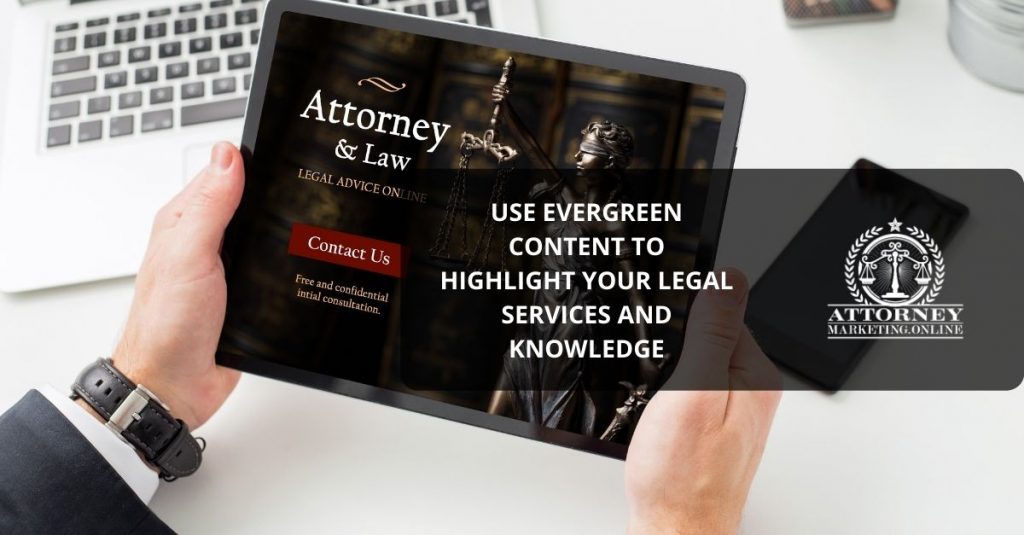Evergreen content, or articles, blog posts, or reports that can be used now and in the future, addresses relevant topics and answers many of your readers’ questions. This type of content is often found in the FAQs on your website, as time has not affected either the question or answer.
Examples of Evergreen Questions
Examples of evergreen questions include the following:
- What should you do after an auto accident?
- How do you prove negligence in a medical malpractice case?
- What documents do you need to file a personal injury claim?
Non-Evergreen Questions
You won’t find non-evergreen content in the F.A.Q’s as non-evergreen material represents the trending topics of the day. Examples include the following:
- What are the current income requirements for IRA investments for married couples?
- What changes have been made in the law for seeking pandemic relief?
While non-evergreen and evergreen can drive traffic to your website, evergreen content provides consistent value over time.
One Piece of Content Can Make All the Difference
Did you know that one content piece can generate millions of dollars worth of business per year? It only takes one piece of content. Therefore, when it comes to writing content for a report, your website, or a blog post, this is important to keep in mind.
In this case, the addition of evergreen content, especially a long-form piece, typically fuels this type of response. Therefore, it’s important to review the benefits of using content that is timeless and well-written.
Creating an Evergreen Guide
Creating a legal guide offers you the best opportunity to use evergreen facts and information to highlight your services. To produce this informative report, you need to determine, first, the types of cases you wish to manage.
While you don’t want your report to be too broad, you also don’t want to narrow its focus too much either.
For example, creating a guide on personal injury may be too broad. Or, writing a guide on how to write a demand letter is limited in its scope. It’s better to be general yet specific.
Examples of Evergreen Topics
Here are examples of evergreen topics that offer your reader solid info.
- What You Should Do After an Auto Collision?
- How Is Negligence Determined? Your Guide to Understanding the Process
- What is Discovery? When Is It Used?
- When Do You Need to File a Worker’s Compensation Claim? What Are the Steps?
- How Do You File a Personal Injury Claim?
As you can see, the above titles are not too broad or too narrow. They allow you to add subheadings and explanations. They also are more definitive and address specific processes or steps.
How to Target Your Client’s Needs
To create evergreen material, you need to target your client’s needs and show how you can help solve them. Create a demographic or persona for your firm by asking the following:
- What are your audience’s demographics – socio-economic background, gender, age, etc.?
- Where do your clients live?
- What are your client’s common concerns or goals?
- What are your client’s anxieties or fears?
- What questions do clients frequently ask?
- What is a real-world example of a client who received your legal advice? What issues and concerns did they face? How were you able to help?
These questions will assist you in developing evergreen topics for your marketing campaign.
For example, let’s say you want to further develop content for a report or for future blogs on the topic, “What Should I Do After an Auto Collision?”
Questions You Might Ask
To expound on this subject, you might ask the following:
- How should I report a car accident? What are the steps?
- What information should I gather after a car accident?
- How do you determine fault after an auto accident?
- Should I discuss the accident with the other party’s insurance company or report it immediately to my insurer?
- Will my insurance company pay for the time I missed from work?
- Who typically pays the medical bills after an auto accident?
- Is the insurance company obligated to replace a totaled vehicle?
- Why should I talk to a car accident attorney?
Performing a Keyword Analysis
The above questions will help you in performing a keyword analysis.
So, how do you do this?
Let’s provide an example.
Start by searching Google.
Ask the question, for example, “How do you determine fault after an accident?”
Examples of Keywords
Here are examples are some keywords you might find:
- Who is at fault in an auto accident
- At-fault accident
- Auto accident fault rules
Use a Keyword Tool
Review these keywords by heading over to Serpfox. Using this tool is the easiest way to determine a ranking for the words you wish to use.
In this case, you might use the above words as your primary keywords for creating a report/guide, blog post, or guest post. Use this process for each of your topics so you have a list of primary and secondary keywords for your evergreen content.
According to Semrush, you also need to pay attention to internal and outbound linking and on-page SEO elements. These elements include meta descriptions and title tags. Include images and CTAs as well.
Who to Call about Content Marketing Services
Evergreen content is writing that you can reuse, share, and create to build your persona and brand. Learn more about creating the copy and developing your SEO strategy by contacting a top legal marketer in the field. Call Attorney Marketing Online at (888) 992-9529 or (323) 433-6529 for further details.

